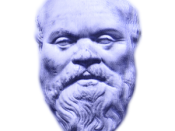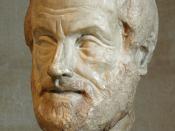In Nicomachean Ethics Aristotle introduces several ideas about ethics, a key one being that ethics is teleological (goal-directed). According to Aristotle, everything has a purpose, or end, and this includes humans. Aristotle argues that this purpose or function is directly related to living a fulfilled life, depending on how well it is exercised, and this in turn is linked to what is "good".
Since human beings have parts that all have functions and humans are composed of these parts, it makes sense to say that humans must have a function themselves. In the same way that these parts are part of the body as a whole, their functions are part of a whole function. However, to ascertain what the function of humans is we must first define what a function actually is: it is what makes a thing what it is, it makes it unique. In this way Aristotle can determine some things which the human function is not.
The human function cannot be to live and reproduce or to perceive the world, because plants live and reproduce and animals perceive; They are not unique characteristics of humans. Aristotle then concludes that the thing which sets us apart from any other animal is our ability to reason, so the human function is to actively use good reason in our lives (because something's "good" is brought about by carrying out its function well, so a human's "good" comes from reasoning well). If we live well according to this, we will be able to achieve a "fulfilled" life which is the ultimate end of life.
Aristotle put forward the idea that happiness is the ultimate end of life, the "chief good". He believed that if we asked ourselves why we desire certain things we could come out with happiness as the...



Great Paper.
Very well written and researched.
1 out of 1 people found this comment useful.